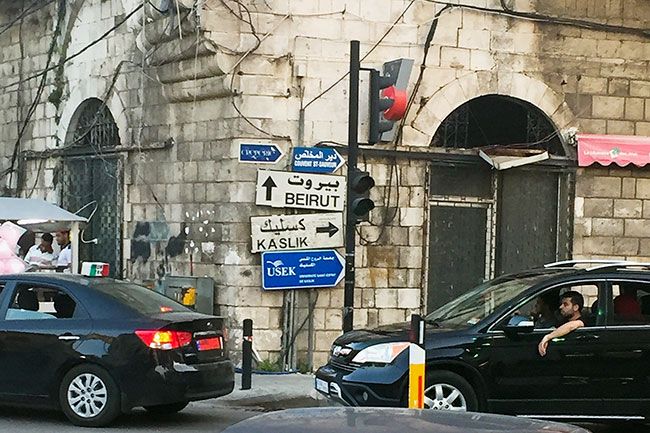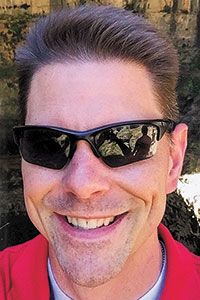Eric Schuck: Remember not war’s victors, but rather its hapless victims


About the writer: Eric Schuck holds a Ph.D. in economics from Washington State University and a professorship in economics at Linfield University. He has twice been honored with Fulbright Fellowships to work and study abroad, once in South Africa and once in Lebanon. A captain in the Navy Reserve, he’s also served a pair of active-duty military tours in the Middle East, one of them featuring a return trip to Lebanon.
Lebanon is an easy place to love, but not an easy place to live. I’ve been there twice, both times on the government’s dime.
The first time I went as a professor, spending the summer of 2009 teaching water resource economics at the American University of Beirut on a Fulbright. I returned eight years later as a naval officer, coordinating logistics for training exercises between the U.S. Navy and the Lebanese Armed Forces, known as the LAF.
It probably goes without saying, but the experiences were, to say the least, different.
Heading to Beirut the first time, I had no clear expectations. What I discovered was a graceful, lively, vibrant and cosmopolitan city.
I lived near the university, where the wars of the previous decades had left the neighborhoods largely untouched.
It took no effort at all to find the “Paris of the Middle East.” It was home to open-air markets and cafes.
Not a day went by where I could not turn a corner and find students holding pop-up dances and concerts. It was utterly enchanting.
Except, of course, when it was not, as war scars also surrounded me.
My apartment overlooked the crater where the U.S. Embassy once stood, and each morning, I ran through the long shadow of the bomb-blasted and burnt-out Holiday Inn. Opened a year before the civil war ignited in 1975, the hotel became — and remains — a no man’s land.
It’s empty of life, but curtains still flutter in its long-shattered windows. The durability of 1970s polyester is nothing short of staggering.
It could be scary, too.
A week after I arrived, riots over a contested parliamentary election led to shootouts between militia units and security forces. The crossfire killed a young mother on a balcony a few blocks from me.
Another time, I awoke to the clatter of M113s setting up a checkpoint at an intersection near my apartment, with cannons sweeping down each street. It was not the view I wanted with my coffee on a Sunday morning.
Over it all lay the specter of Hizbullah (also spelled Hezbollah). The powerful militia, practically a state-within-a-state, has long both outnumbered and outgunned the Lebanese government.
Each time we made visits to the university’s research farm in the Beqa’a Valley, we passed through fortified checkpoints marking where the Lebanese government’s power ended and the Shia militia’s began. And while Hizbullah-run towns generally featured cleaner streets and less litter, the price was clear:
Banners honoring the “martyred” dead hung from every lamppost and street sign. It was unsettling.
When I returned the second time, it was both unplanned and unexpected. But I was overjoyed revisiting a place I dearly loved and feared I might never see again.
We were there to learn and teach, sharing knowledge and expertise with the Lebanese Armed Forces in a bilateral exchange.
It was hard. While my first visit focused on plowshares, this one focused on swords — and that’s not an easy transition.
However, I firmly believe it was an essential task. For the Lebanese state to earn more trust than Hizbullah, it had to create credible forces. Our mission was to help achieve that.
The security situation created challenges. We rarely traveled in uniform, and never without an armed escort. In addition, we made a point of not missing curfew at the LAF base.
Yet even within those limits, we caught glimpses of what makes Lebanon so very special, whether hiking on Mount Lebanon, eating kibbeh labanieh at a streetside café near my old apartment or sipping cocktails in the ancient souq in Jbeil — to this day, the best French 75 I’ve had in my life, although locally, the Conservatory does a stellar one.
My café visits initially caused some consternation among our escorts. My knowledge of Beirut’s side streets terrified them until they learned I’d taught at American University there.
Ironically, when I left the second time, I fully expected to be back soon. Everything went well enough that I was slated to return as the Fifth Fleet’s resident expert on Lebanese logistics planning.
Sadly, the “needs of the Navy” intervened. As a result, I was sent to other ports in the Middle East.
It’s a long story — one in which I cannot, to this day, separate the tragedy and farce. The upshot was, I have yet to return.
I’d like to, but the intervening years have been hard on Lebanon. It’s endured a financial crisis, the pandemic, an accidental explosion that leveled most of the Port of Beirut, and now renewed war between Hizbullah and Israel.
Each day, I watch the news. Each day, I see images of destruction and waste in streets I know and places I treasure.
Buildings and roads can be rebuilt. People cannot.
More than anything, I pray for the safety of my American University student and faculty colleagues, the LAF sailors I helped train with the Navy, and the families of them all. I hope against hope for their wellbeing.
In that worry is a lesson learned only from peering into a warzone half a world away: While the warring sides seek to declare themselves “victors,” we would all do better to remember and care for their “victims” — on all sides.








Comments